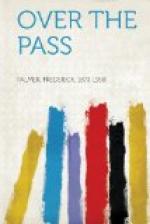“Time is nothing!” says the Eternal Painter. “If you feel important, remember that man’s hectic bustling makes but worm-work on the planet. Live and breathe joyfully and magnificently! Do not strain your eyes over embroidery! Come to my open gallery! And how do you like the way I set those silver clouds a-tumbling? Do you know anything better under the dome of any church or capitol? Shall I bank them? Line them with purple? It is done! But no! Let us wipe it all out, change the tint of our background, and start afresh!”
With his eleven hundred million billionth sunset, or thereabouts, His Majesty held a man and a woman who had met on the roof of the world in thrall. He was lurid at the outset, dipping his camel’s hair in at the round furnace door sinking toward the hills, whose red vortex shot tongues of flame into canyons and crevasses and drove out their lurking shadows with the fire of its inquisition. The foliage of Little Rivers became a grove of quivering leaves of gold, set on a vast beaten platter of gold. And the man and the woman, like all things else in the landscape, were suffused in this still, Parnassian, penetrating brilliancy, which ought to make even a miser feel that his hoarded eagles and sovereigns are ephemeral dross.
“I love it all—all the desert!” said Mary Ewold.
“And I, too!”
“I have for six years.”
“I for five.”
The sentences had struck clearly as answering chimes, impersonally, in their preoccupied gazing.
“It gave me life!” he added.
“And it gave me life!”
Then they looked at each other in mutual surprise and understanding; each in wonder that the other had ever been anything but radiant of out-of-doors health. That fleck on the lungs which brought a doctor’s orders had long ago been healed by the physician of the ozone they were breathing.
“And you remained,” he said.
“And you, also,” she answered.
Their own silence seemed to become a thing apart from the silence of the infinite. It was as if both recognized a common thought that even the Eternal Painter could not compel oblivion of the past to which they did not return; of the faith of cities to which they had been bred. But it is one of the Eternal Painter’s rules that no one of his subjects should ask another of his subjects why he stays on the desert. Jack was the first to speak, and his voice returned to the casual key.
“Usually I watch the sunset while we make camp,” he said. “I am very late to-night—late beyond all habit; and sunset and sunrise do make one a creature of habit out here. Firio and my little train will grow impatient waiting for me.”
“You mean the Indian and the burro with the silver bells that came over the pass some time before you?”
Of course they belonged to him, she was thinking, even as she made the inquiry. This play cowboy, with his absurdly enormous silver spurs, would naturally put bells on his burro.




